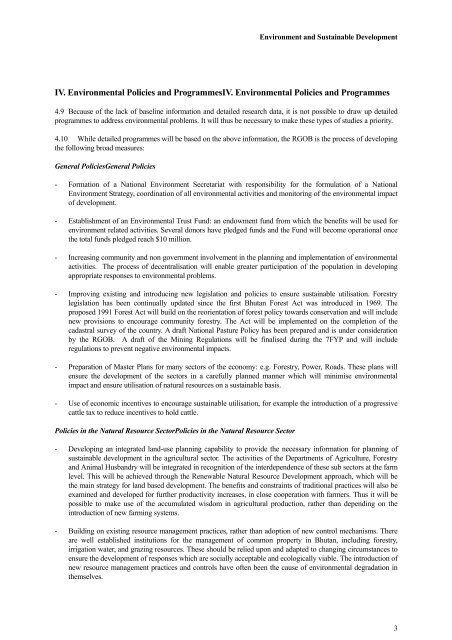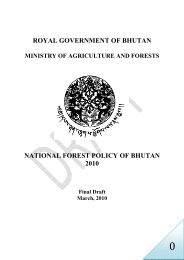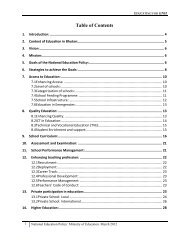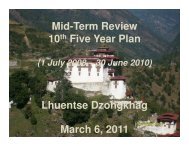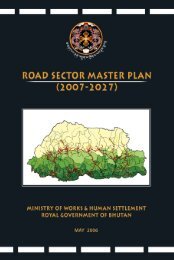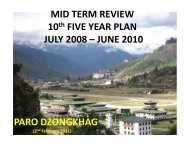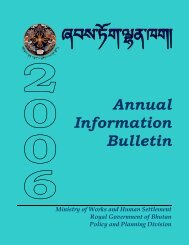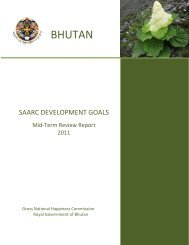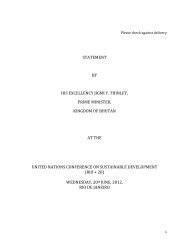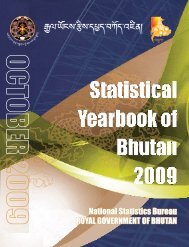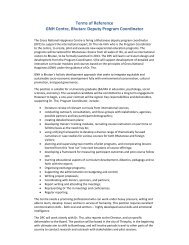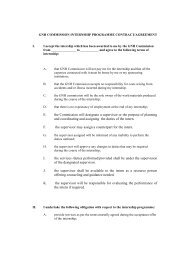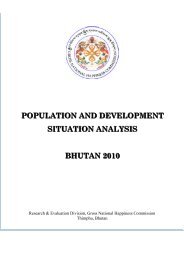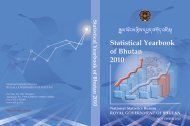COUNTRY BACKGROUND - Gross National Happiness Commission
COUNTRY BACKGROUND - Gross National Happiness Commission
COUNTRY BACKGROUND - Gross National Happiness Commission
Create successful ePaper yourself
Turn your PDF publications into a flip-book with our unique Google optimized e-Paper software.
Environment and Sustainable Development<br />
IV. Environmental Policies and ProgrammesIV. Environmental Policies and Programmes<br />
4.9 Because of the lack of baseline information and detailed research data, it is not possible to draw up detailed<br />
programmes to address environmental problems. It will thus be necessary to make these types of studies a priority.<br />
4.10 While detailed programmes will be based on the above information, the RGOB is the process of developing<br />
the following broad measures:<br />
General PoliciesGeneral Policies<br />
- Formation of a <strong>National</strong> Environment Secretariat with responsibility for the formulation of a <strong>National</strong><br />
Environment Strategy, coordination of all environmental activities and monitoring of the environmental impact<br />
of development.<br />
- Establishment of an Environmental Trust Fund: an endowment fund from which the benefits will be used for<br />
environment related activities. Several donors have pledged funds and the Fund will become operational once<br />
the total funds pledged reach $10 million.<br />
- Increasing community and non government involvement in the planning and implementation of environmental<br />
activities. The process of decentralisation will enable greater participation of the population in developing<br />
appropriate responses to environmental problems.<br />
- Improving existing and introducing new legislation and policies to ensure sustainable utilisation. Forestry<br />
legislation has been continually updated since the first Bhutan Forest Act was introduced in 1969. The<br />
proposed 1991 Forest Act will build on the reorientation of forest policy towards conservation and will include<br />
new provisions to encourage community forestry. The Act will be implemented on the completion of the<br />
cadastral survey of the country. A draft <strong>National</strong> Pasture Policy has been prepared and is under consideration<br />
by the RGOB. A draft of the Mining Regulations will be finalised during the 7FYP and will include<br />
regulations to prevent negative environmental impacts.<br />
- Preparation of Master Plans for many sectors of the economy: e.g. Forestry, Power, Roads. These plans will<br />
ensure the development of the sectors in a carefully planned manner which will minimise environmental<br />
impact and ensure utilisation of natural resources on a sustainable basis.<br />
- Use of economic incentives to encourage sustainable utilisation, for example the introduction of a progressive<br />
cattle tax to reduce incentives to hold cattle.<br />
Policies in the Natural Resource SectorPolicies in the Natural Resource Sector<br />
- Developing an integrated land-use planning capability to provide the necessary information for planning of<br />
sustainable development in the agricultural sector. The activities of the Departments of Agriculture, Forestry<br />
and Animal Husbandry will be integrated in recognition of the interdependence of these sub sectors at the farm<br />
level. This will be achieved through the Renewable Natural Resource Development approach, which will be<br />
the main strategy for land based development. The benefits and constraints of traditional practices will also be<br />
examined and developed for further productivity increases, in close cooperation with farmers. Thus it will be<br />
possible to make use of the accumulated wisdom in agricultural production, rather than depending on the<br />
introduction of new farming systems.<br />
- Building on existing resource management practices, rather than adoption of new control mechanisms. There<br />
are well established institutions for the management of common property in Bhutan, including forestry,<br />
irrigation water, and grazing resources. These should be relied upon and adapted to changing circumstances to<br />
ensure the development of responses which are socially acceptable and ecologically viable. The introduction of<br />
new resource management practices and controls have often been the cause of environmental degradation in<br />
themselves.<br />
3


